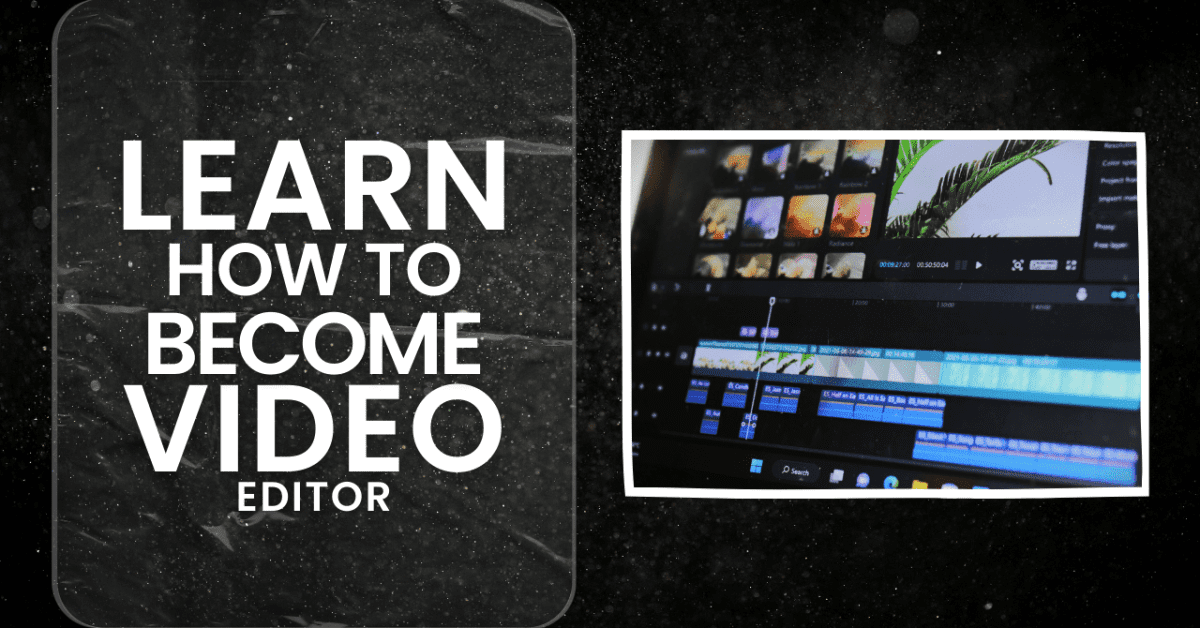In 2024, the demand for video editor continues to surge as digital content consumption escalates across various platforms. From social media to streaming services and corporate presentations, the need for captivating visual storytelling has become paramount. This burgeoning demand is fueled by the ever-expanding digital landscape and the proliferation of video content as the preferred medium for communication and engagement.
Video editing skills have evolved from being merely advantageous to downright indispensable in today’s diverse industries. Whether it’s marketing, entertainment, education, or corporate communication, businesses and individuals alike rely on compelling video content to capture attention, convey messages effectively, and foster meaningful connections with their audience. In this era of multimedia dominance, possessing proficient video editing skills is no longer a luxury but a crucial asset for anyone looking to thrive in the dynamic world of digital media.
Table of Contents
Role of a Video Editor
A video editor is a creative professional responsible for assembling raw footage into a polished, cohesive video product. Their primary role involves manipulating and rearranging video and audio clips to craft a compelling narrative or message.

Video editors work with various elements such as visual effects, transitions, sound effects, and music to enhance the overall quality and impact of the video. They often collaborate closely with directors, producers, and other members of the production team to bring their vision to life. Video editors must possess strong technical skills in video editing software and have a keen eye for detail and storytelling.
Types of projects video editors work on:
- Films: Video editors play a crucial role in the post-production process of feature films, documentaries, and short films. They work closely with directors and producers to edit raw footage into a coherent storyline, add visual effects, and fine-tune the overall pacing and rhythm of the film.
- Commercials: In the advertising industry, video editors create commercials and promotional videos for brands and companies. They work with marketing teams to develop creative concepts and then edit the footage to effectively convey the brand message and engage the target audience.
- Social Media Content: With the rise of social media platforms like Instagram, TikTok, and YouTube, video editors are in high demand to create engaging and shareable content for online audiences. They edit videos to fit the specific requirements of each platform and optimize them for maximum reach and engagement.
- Television Shows: Video editors are integral to the production of television shows, including dramas, sitcoms, reality shows, and news programs. They edit raw footage into episodes, adding graphics, music, and special effects as needed to enhance the viewing experience.
- Corporate Videos: Many businesses use video as a tool for internal communications, training, and marketing purposes. Video editors in the corporate sector edit videos for presentations, employee training modules, product demonstrations, and promotional materials.
- Music Videos: Video editors collaborate with musicians and music producers to create visually stunning music videos that complement the music and capture the audience’s attention. They often incorporate creative visual effects and storytelling techniques to enhance the viewer’s experience.
Skills Required to Become a Video Editor
To excel as a video editor in 2024, you’ll need a robust set of skills that go beyond just knowing how to use editing software. Here are the key skills required to thrive in this dynamic field:
- Proficiency in Video Editing Software: Mastery of popular editing software like Adobe Premiere Pro, Final Cut Pro, or DaVinci Resolve is non-negotiable. These tools are the bread and butter of any video editor, allowing you to cut, splice, and polish footage to perfection. Familiarize yourself with their features, shortcuts, and workflow to streamline your editing process.
- Understanding of Storytelling and Visual Communication Principles: At its core, video editing is about storytelling. You need to have a keen understanding of narrative structure, pacing, and emotional resonance to craft compelling stories that captivate your audience. Learn how to use visual elements like framing, composition, and color to convey mood and enhance storytelling.
- Knowledge of Basic Cinematography and Camera Operation: While you may not be behind the camera yourself, understanding the fundamentals of cinematography and camera operation will make you a more effective editor. Familiarize yourself with concepts like shot types, camera movements, and lighting techniques to better interpret and manipulate raw footage.
- Ability to Work with Audio, Including Sound Design and Mixing: Sound is just as important as visuals in video editing. Develop your skills in sound design, including adding and manipulating sound effects, music, and dialogue to enhance the viewer’s experience. Learn how to mix and balance audio elements to create a cohesive and immersive soundscape.
In addition to these technical skills, it’s essential to cultivate creativity, attention to detail, and problem-solving abilities. Keep practicing, experimenting, and honing your craft to stay ahead in this competitive industry.
Education and Training
When considering a career as a video editor, there are various avenues for education and training to explore, catering to different learning styles and preferences.
- Formal education options provide structured learning environments and in-depth knowledge of video editing principles. Consider enrolling in degree programs such as film production, media studies, or digital media arts. These programs often offer courses specifically focused on video editing techniques, software training, and storytelling fundamentals. Additionally, workshops and seminars conducted by industry professionals can offer valuable insights and hands-on experience in specific areas of video editing.
- Online resources and tutorials offer a flexible and accessible way to learn video editing skills at your own pace. Platforms like Udemy, Lynda (now LinkedIn Learning), and Skillshare offer a wide range of courses covering various aspects of video editing, from beginner to advanced levels. YouTube also hosts countless tutorials and guides created by experienced editors, providing practical tips and tricks, software demonstrations, and troubleshooting advice. These resources can supplement formal education or serve as standalone learning paths for self-motivated individuals.
- Hands-on experience through internships or freelance work is invaluable for honing your video editing skills and gaining real-world insight into the industry. Seek out internships at production companies, post-production studios, or media agencies to immerse yourself in professional workflows and collaborate with experienced professionals. Freelancing offers the opportunity to work on diverse projects, build a portfolio, and establish connections within the industry. While formal education provides a solid foundation, hands-on experience allows you to apply theoretical knowledge in practical scenarios, develop problem-solving skills, and refine your artistic vision as a video editor.
Building a Portfolio
Building a strong portfolio is essential for aspiring video editors to showcase their skills and attract potential clients or employers. Here’s how you can effectively build and present your portfolio:
- Selecting and Showcasing Your Best Work: When selecting pieces for your portfolio, focus on quality over quantity. Choose projects that demonstrate your technical skills, creativity, and ability to tell a compelling story through video editing. Whether it’s a short film, commercial, music video, or social media content, ensure that each piece reflects your best work. Consider including a variety of projects to showcase your versatility as a video editor.
- Diversifying Your Portfolio with Different Types of Projects: It’s important to diversify your portfolio to appeal to a broader range of clients or employers. Include a mix of projects across different genres, industries, and formats. For example, you might have one section of your portfolio dedicated to narrative storytelling, another for corporate videos, and another for experimental or passion projects. This diversity not only demonstrates your range as a video editor but also increases your chances of attracting opportunities in various fields.
- Creating a Personal Brand and Online Presence: In addition to showcasing your work, it’s essential to build a personal brand and establish a strong online presence. This includes creating a professional website or online portfolio where potential clients or employers can view your work and learn more about you. Consider including a biography, testimonials from previous clients or collaborators, and contact information for inquiries. Utilize social media platforms such as LinkedIn, Instagram, and Vimeo to share your work, connect with industry professionals, and stay engaged with relevant communities. Consistency in branding and regular updates will help you stand out in a competitive field.
Remember, your portfolio is a reflection of your skills, professionalism, and personality as a video editor. Take the time to curate and present it thoughtfully, and you’ll be well on your way to building a successful career in video editing.
Networking and Finding Opportunities
Networking and finding opportunities are essential steps on the path to becoming a successful video editor. Here’s how you can effectively expand your professional network and discover new opportunities:
- Joining Professional Organizations and Online Communities: Joining professional organizations related to video editing can provide valuable networking opportunities and resources for career growth. Look for organizations such as the American Cinema Editors (ACE) or the International Documentary Association (IDA) that offer memberships and online communities where you can connect with fellow professionals, share experiences, and learn from industry experts. Engaging in these communities can also help you stay updated with the latest trends and developments in the field.
- Attending Industry Events, Conferences, and Meetups: Industry events, conferences, and meetups provide excellent opportunities to network with other video editors, filmmakers, and industry professionals. Attend events such as film festivals, editing workshops, and industry-specific conferences where you can meet potential collaborators, mentors, and employers. Participating in panel discussions, workshops, and networking sessions at these events can help you establish meaningful connections and gain insights into the industry.
- Utilizing Online Platforms for Job Searching and Networking: In today’s digital age, online platforms play a crucial role in job searching and networking for video editors. Platforms like LinkedIn offer dedicated sections for creative professionals where you can showcase your skills, connect with industry professionals, and discover job opportunities. Additionally, freelance websites such as Upwork, Freelancer, and Fiverr can be valuable resources for finding freelance gigs and building your client base. Make sure to optimize your profiles on these platforms, showcase your portfolio, and actively engage with potential clients and collaborators to expand your network and find new opportunities.
By actively participating in professional organizations, attending industry events, and leveraging online platforms, you can effectively network with other professionals in the field and uncover new opportunities for career advancement as a video editor.
Staying Updated with Industry Trends and Technology
Staying updated with industry trends and technology is crucial for any aspiring video editor looking to thrive in the dynamic landscape of 2024. Here’s why:
Continuous learning and skill development are essential in an industry where new tools and techniques emerge regularly. Video editing software is constantly evolving, with updates and features that can enhance efficiency and creativity. By staying abreast of these developments, you can remain competitive and offer clients or employers the latest and most innovative solutions.
To stay informed, it’s essential to follow industry blogs, forums, and social media accounts dedicated to video editing. These platforms serve as valuable resources for staying updated on the latest trends, software updates, and best practices. Engaging with the community can also provide opportunities for networking and collaboration, helping you stay connected with fellow professionals and potential mentors.
Additionally, don’t hesitate to experiment with new techniques and software features. Whether it’s exploring advanced editing tools, experimenting with different visual effects, or mastering new editing styles, hands-on experimentation is key to expanding your skill set and staying ahead of the curve. Don’t be afraid to push the boundaries of your creativity and explore uncharted territory – it’s often through experimentation that breakthroughs happen and new trends are born.
Overcoming Challenges and Building a Successful Career
Building a career as a video editor comes with its own set of challenges, but with determination and perseverance, you can overcome them and achieve success in the industry. Here are some key strategies for navigating obstacles and building a fulfilling career:
- Dealing with Competition: The field of video editing is highly competitive, with many talented individuals vying for the same opportunities. Instead of seeing other editors as rivals, view them as potential collaborators or sources of inspiration. Focus on honing your unique skills and style to stand out in the crowd.
- Handling Rejection: Rejection is inevitable in any creative industry, but it’s essential not to let it discourage you. Use rejection as an opportunity to learn and grow. Analyze feedback from clients or employers constructively, and use it to improve your skills and approach.
- Developing Resilience: Building a successful career in video editing requires resilience in the face of setbacks and challenges. Stay motivated by setting realistic goals for yourself and celebrating your achievements along the way. Remember that every obstacle you overcome is a valuable learning experience that will ultimately make you a stronger editor.
- Seeking Mentorship and Guidance: Don’t hesitate to reach out to more experienced professionals in the industry for mentorship and guidance. Whether through formal mentorship programs, networking events, or online communities, learning from others’ experiences can provide valuable insights and help you navigate the complexities of the field.
- Maintaining Work-Life Balance: The fast-paced nature of the video editing industry can sometimes lead to burnout if you’re not careful. Prioritize self-care and establish boundaries between your work and personal life. Taking breaks, pursuing hobbies outside of work, and spending time with loved ones are all essential for maintaining your well-being and long-term success.
By adopting a proactive mindset and embracing the inevitable challenges that come with pursuing a career in video editing, you can position yourself for success and build a fulfilling career in this dynamic and rewarding field.
In conclusion, we’ve explored the essential steps and skills necessary to embark on a journey toward becoming a proficient video editor in 2024. We’ve delved into the multifaceted role of a video editor, emphasizing the importance of mastering editing software, understanding storytelling principles, and honing creative and technical abilities. Through education, training, and the development of a robust portfolio, aspiring video editors can position themselves for success in this dynamic field.
To those who are considering pursuing a career in video editing, I offer my encouragement and support. The path may present challenges, but with dedication, perseverance, and a passion for visual storytelling, you can overcome obstacles and achieve your goals. Remember to embrace every opportunity for learning and growth, whether through formal education, hands-on experience, or networking with industry professionals.
As we look ahead to the future of video editing in 2024 and beyond, it’s clear that the demand for skilled editors will continue to rise. With advancements in technology and the ever-evolving landscape of digital media, opportunities for creativity and innovation abound. By staying informed about industry trends, adapting to new technologies, and refining your craft, you can position yourself at the forefront of this exciting field and shape the future of visual storytelling. Embrace the journey, and let your passion for video editing propel you toward a fulfilling and successful career.



